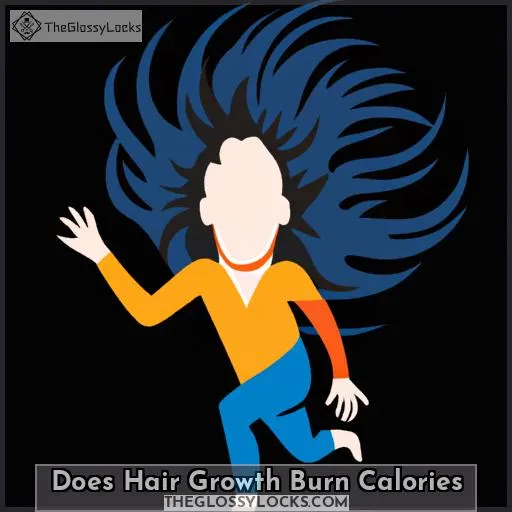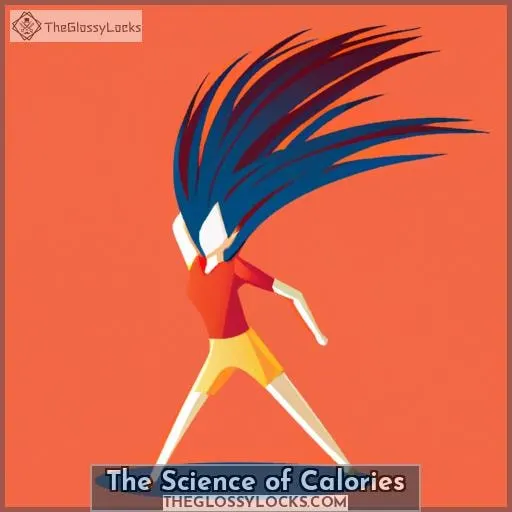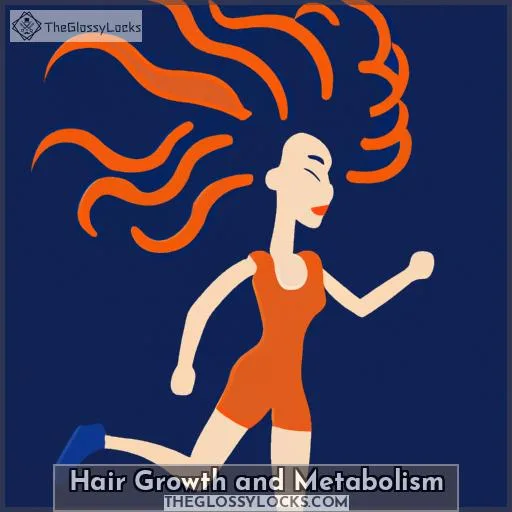This site is supported by our readers. We may earn a commission, at no cost to you, if you purchase through links.
Do you ever wonder if growing your hair could help burn calories? It may seem unlikely, but there are scientific studies that suggest it might be possible.
In this article, we will explore the science behind calorie burning and how hair growth can potentially contribute to it. We’ll look at what factors affect the metabolic rate of an individual as well as how nutrition plays a role in healthy hair growth.
Finally, we’ll answer our central question: does hair growth really burn calories? By exploring these topics together, we can better understand our own personal metabolism and learn more about unique methods for weight maintenance or loss!
Table Of Contents
Key Takeaways
- Growing hair may contribute to calorie burning.
- Cooler temperatures help activate brown fat cells to burn calories more efficiently, which can further promote hair growth.
- Regular physical activities stimulate circulation to the scalp, resulting in thicker and longer hair.
- Proper diet, increased protein intake, and vitamins are essential for healthy hair growth, which can also impact calorie burning.
The Science of Calories
You may have heard of the terms ‘calories’ and ‘kilojoules’ but what do they mean?
Calories are a unit of energy that measure the amount of energy we get from foods and beverages, while kilojoules are used to describe how much energy our bodies use.
To put it simply, when you sleep, your body is resting so not much energy is being used – which means fewer calories burned. An increase in heart-rate or regulating temperature requires more effort for your body, so you burn more calories.
Additionally, muscle metabolism also burns quite a few calories as your muscles convert food into fuel during exercise.
What Are Calories and Kilojoules?
You may have heard of calories and kilojoules, but do you know what they actually are?
Calories and kilojoules are both units of energy. Eating the right amount of food to fuel your body’s daily activities is essential for maintaining a healthy lifestyle.
Calorie-counting articles can help when it comes to understanding how many calories you need in order to stay fit or lose weight. Exercise benefits such as increased metabolism, improved nutrition intake, better sleep quality, and natural calorie-burning activities will all contribute towards optimal health outcomes.
Additionally, the thermic effect from chewing thoroughly before swallowing helps with postprandial satiety, while brown fat increases heat production, which also aids in calorie-burning activity during physical exercise routines or even just by simply regulating one’s body temperature through seasonal acclimatization practices like using light blankets at night time or wearing cotton PJs throughout winter months!
Sleep It Off
Getting a good night’s sleep is one of the best ways to maintain your weight. Studies have shown that those who get enough sleep are up to 65% more likely to reach and stay at their ideal body mass index.
Not only does proper rest help you regulate energy balance, it can also reduce exercise intensity by reducing stress hormones. Moreover, sleeping helps keep your muscle mass in check while promoting brown fat production which increases metabolic processes like thermogenesis and mastication time.
This not only aids in weight loss but can also help protect against heart disease as well as other ailments caused by obesity or excess weight gain. A light blanket and cotton PJs will give you just the right amount of warmth for optimal calorie burning throughout the night – so make sure you’re getting all eight hours!
Regulating Temperature
Staying warm with a light blanket and cotton PJs helps boost your metabolism overnight. Cell activation, metabolic rate, and temperature sensitivity all play important roles in body weight maintenance.
Brown fat is activated when the body’s internal temperature cools down; this increases fat burning as well as metabolic rate. Coconut oil does not enhance thermogenesis or increase brown fat activity but cold temperatures can do so naturally!
Cooler temperatures help activate brown fat cells to burn calories more efficiently throughout the day – keeping you warmer while maintaining your desired weight range at the same time! To maximize calorie-burning potential for regulating body temperature, keep your room slightly cooler during sleep hours to ensure that cell activation remains high without compromising comfort levels or quality of restful sleep.
Increasing Heart-rate
Increasing your heart rate is like revving up an engine, pushing the body to burn more calories and maintain a healthy weight. Engaging in aerobic exercise can increase your heart rate and stimulate brown fat, which burns more calories than white fat.
Additionally, muscle fibers have a higher metabolic rate than fat cells; hence, strength training can boost metabolism even at rest. The thermic effect of food also increases with regular exercise as it aids in cell repair after workouts.
So whether you prefer running or lifting weights, increasing your heart rate through various exercise types will help prevent weight gain and promote overall health without much effort!
Muscle Metabolism
Building up your muscle mass helps boost your metabolism, allowing you to burn more calories even when at rest. Protein-rich foods help build muscles and give the body energy, while also burning calories during digestion.
Brown fat is known for its ability to generate heat in cold temperatures by using energy, which burns extra calories. Chewing food thoroughly increases mastication rate and assists with digestion of fats, proteins, carbohydrates, and other macronutrients.
The ratio between muscle fibres and fat cells affects our metabolic rate. Generally speaking, the higher the percentage of muscle relative to fat tissue, the higher one’s metabolic rate will be. This is due solely to increased usage of stored energies within muscles, rather than depending on caloric intake for body temperature maintenance or regular activities such as walking around or writing a paper.
Cold temperatures can promote brown adipose tissue activation that modulates insulin sensitivity, thus leading towards an increase in calorie consumption over time.
Hair Growth and Metabolism
You might be wondering how hair growth and metabolism are related. Hair growth is a process that takes place in three phases: anagen, catagen, and telogen.
Metabolism has been found to have some influence on the length of each phase and thus affects the overall rate of hair growth. Additionally, there are several other factors which can affect hair growth such as genetics, hormones, or age; plus nutrition plays a major role too!
In this discussion, we will explore the relation between metabolism and hair growth cycle along with other important influencing factors like nutrition for a better understanding of healthy locks!
Hair Growth Cycle
Your hair growth cycle is a complex process that involves various factors, including genetics and nutrition. For example, the nutrients you consume play an important role in how quickly and efficiently your body can produce new hairs. Protein deficiency or inadequate vitamin intake can hinder healthy hair growth while scalp health must be maintained with proper styling techniques to avoid breakage and damage.
Stress levels also affect hair follicles as stress hormones disrupt energy stores needed for optimal development of strands; however, pulse-racing horror movie nights won’t burn many calories! To ensure continual maintenance of weight fundamentals such as brown adipose tissue production during sleep, it’s best to tuck yourself into a light blanket before drifting off peacefully each night.
Metabolism and Hair Growth
Maintaining your weight fundamentals is essential for healthy hair growth. Nutrition intake, hormone levels, scalp health, and healthy hair follicles must all be balanced to promote the best possible results in growing lush locks of hair.
Stress levels should also be managed as too much stress can lead to high blood pressure, which can damage both your physical and mental wellbeing. Regular exercise at the gym or engaging in physical activities like walking or jogging is important for maintaining a healthy lifestyle. This can also reduce risks related to colon cancer that may inhibit proper nutrition absorption needed for thick manes of hair.
Additionally, staying active will help regulate hormone levels while keeping you fit and strong. This not only burns calories but boosts self-confidence along with it!
Factors Affecting Hair Growth
Unlock the secrets to thick, luscious locks of hair and discover how various factors can affect your mane’s growth.
Applying heat from blow dryers or curling irons can damage hair follicles as well as cause split ends. Genetics play a big role in how our hair grows – some people are naturally blessed with luxurious tresses while others must work harder for it.
Hormones also influence hair growth, particularly during puberty when boys’ hormones go into overdrive causing increased facial and body hairs among other changes!
Stress levels have been seen to contribute to thinning or loss of scalp hairs; if you’re feeling overwhelmed try incorporating relaxation techniques like yoga into your daily routine.
Finally, diet changes will impact not just average calorie-counting but different number of calories required by different foods. Harvard Medical School recommends thoroughly mastication prior to swallowing for better postprandial satiety according to the Harvard Heart Letter publication!
The Role of Nutrition in Hair Growth
Eating a balanced diet with the right nutrients is essential for promoting healthy hair growth. Recent research has shown that protein intake affects hair health and its rate of growth significantly, so make sure to include it in your daily meals.
Additionally, maintaining an equilibrium of calories consumed and burned can influence food decisions throughout the day. Following advice from diet gurus or heart health experts on how much you should eat can be beneficial as well.
Hair care products are important too—they provide additional nourishment to ensure healthy locks!
Finally, managing stress levels through exercise routines or other activities is also recommended as it helps prevent excessive shedding which could lead to baldness later on down the road.
Can Hair Growth Burn Calories?
Do you ever wonder if hair growth can burn calories? Understanding how our bodies use and burn calories is an important part of understanding the science behind weight loss.
When it comes to hair growth, though, many people are curious about whether or not this process burns any calories at all. While there have been studies exploring the potential for calorie burning during hair growth, unfortunately the verdict isn’t definitive—it appears that in healthy individuals with normal metabolism rates, little to no additional caloric expenditure occurs during periods of active follicle production.
Understanding Calorie Burning
Understanding the process of calorie burning can help you get a step closer to achieving your health goals. Calorie burning depends on factors such as exercise benefits, food choices, and muscle mass.
Eating protein-heavy foods helps burn more calories during digestion, while cold temperatures promote brown fat which further increases calorie burning ability. Exercise, like weight lifting, burns 90-126 calories in 30 minutes, and sports activities like moderate calisthenics burn 135-189 calories in 30 minutes too!
A light blanket and cotton PJs also boost metabolism overnight, making it important to maintain good sleep quality for weight maintenance purposes. Preventing too much weight loss due to illness or aging is key, as well as preventing excessive gain during adolescence or adulthood – all with the aid of understanding how calorie burning works!
Hair Growth and Calorie Burning
Discover how your body can use calorie burning to benefit your hair growth! It’s important to understand the hormonal regulation of hair growth and how exercise benefits it.
Eating a healthy diet with increased protein intake helps strengthen and nourish the scalp, while managing stress levels is key for optimal overall health.
A rough estimate suggests that exercising burns around 100 calories per hour, but this will vary depending on intensity level and other factors such as age or weight.
Latest developments in research suggest new treatments for those suffering from thinning or balding hair. These include asking important questions about lifestyle habits and genetics before prescribing medication or supplements.
Research breakthroughs indicate a possible connection between certain types of diets, regular physical activity, stress management techniques, hormone balance maintenance, and improved scalp health leading to better quality of stronger hairs growing from the roots.
Knowing these facts can help you make wise decisions regarding energy expenditure versus potential gains in long-term results with respect to healthier looking tresses!
Studies on Hair Growth and Calorie Burning
Exercising can help you achieve healthier tresses and even burn calories in the process! One way to do this is by monitoring your protein intake. A balanced diet with adequate amounts of quality proteins helps hair growth while providing energy for exercise.
Additionally, maintaining healthy exercise habits such as regular cardio will impact the body’s overall metabolism which directly affects calorie burning. It’s also important to keep up with sleep quality, hormones, and temperature regulation – late nights are not recommended!
Cardiopulmonary response plays a role too; when we engage in our favorite physical activities like running or swimming, oxygen delivery increases throughout our body including our scalp region where hair follicles live leading to improved circulation thus aiding their growth along with calorie burning benefits.
There are dozens of other activities that have beneficial effects on both hair health and calories burnt – so why not give it a try?
The Verdict on Hair Growth and Calorie Burning
You can reap the benefits of healthier tresses and burned calories by engaging in regular physical activities. For instance, Jane noticed that after she began running regularly, her hair was growing faster, and she was burning more calories than before.
Exercise can stimulate circulation to your scalp which is beneficial for healthy hair growth, resulting in thicker and longer locks overtime! Additionally, exercising helps reduce stress hormones that are known to cause damage to the hair follicles leading to thinning or baldness over time.
A balanced diet rich with nutrients also aids in stimulating natural growth as well as provide essential vitamins needed for nourishment from within without you having to burn a single calorie!
Stress management techniques like meditation, along with good sleep hygiene habits, will help boost energy levels while aiding overall body health, including promoting healthier looking strands too!
From monthly advisories on expert information about home repair projects all the way down through making sure you take care of your favorite physical activities, there’s no better time than now to make sure that both your head (and heart) are getting what they need today so tomorrow everything else falls into place inside-out–including those luscious locks we know everyone loves showing off everywhere they go!
Frequently Asked Questions (FAQs)
How can I maximize hair growth?
To maximize hair growth, you should eat a balanced diet rich in vitamins and minerals. Use shampoo to keep your scalp clean and massage your scalp regularly to improve circulation. Additionally, reducing stress levels and getting enough sleep each night can also help. Finally, avoid using harsh styling products that can damage your hair.
What vitamins and minerals are important for healthy hair growth?
Vitamins A, C, and E, as well as biotin, are essential for healthy hair growth. Protein helps build strong strands, while minerals like zinc and iron promote follicle strength. Eat a balanced diet to get these nutrients, or take supplements if necessary!
What home remedies can help with faster hair growth?
Try these home remedies for faster hair growth!
Massage your scalp with essential oils and use natural shampoos and conditioners to give your hair the nourishment it needs.
Cut down on the heat styling tools you use and get regular trims to remove split ends.
Remember to eat a healthy diet rich in vitamins and minerals like biotin or iron – it’s an ironic twist that’ll have you looking great in no time!
Are there any lifestyle changes I can make to promote hair growth?
Eating a balanced diet with plenty of vitamins and minerals, exercising regularly to increase circulation, and managing stress levels can all help promote hair growth.
Make sure to get enough sleep too – it’s essential for healthy hair!
Are there any products that claim to increase hair growth?
Yes, there are many products that claim to increase hair growth. For instance, studies show that taking a biotin supplement can boost hair growth by up to 25%.
Try it out and see if it works for you!
Conclusion
In conclusion, hair growth doesn’t directly cause you to burn calories. However, the factors that impact hair growth, such as proper nutrition, can indirectly affect your calorie burn.
Eating nutrient-rich foods, like proteins, can increase your metabolism and, in turn, boost your calorie burn. Regular exercise and sufficient rest can also help to increase your calorie burn.
So, while hair growth itself isn’t a calorie-burning activity, it can be a useful indicator of your overall health and calorie burn.
Think of your diet and exercise habits as the foundation of a strong and healthy home. Your hair health is the roof that protects that foundation. If the roof is weak, the foundation will ultimately fail. Therefore, it’s crucial to take care of both your hair and your overall health.






